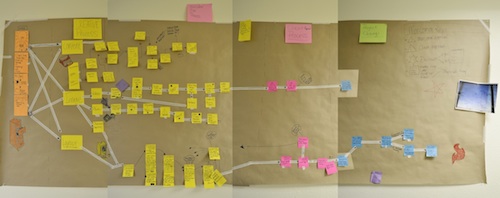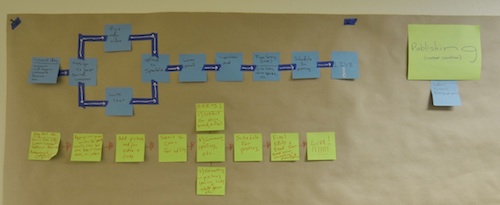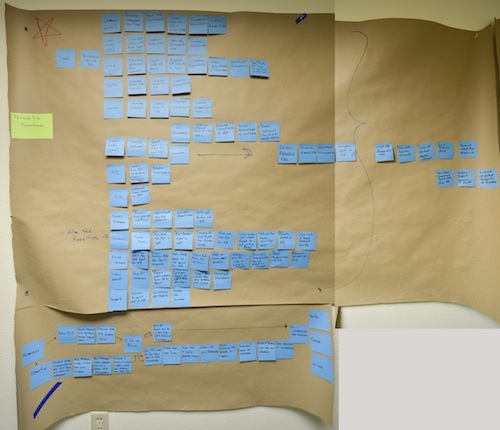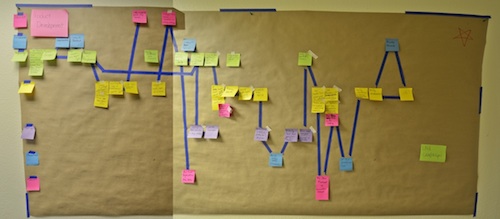A little over six months ago, five members of the SFE team spent three days at ERP Boot camp offered by Panorama Consulting located here in Colorado. For those who have never heard of ERP (Enterprise Resource Planning) it is software that allows all of the operations of a company to function on one platform and for information to be shared and commingled on that platform from multiple areas of the company.
While the five of us walked away with differing opinions on the value of an ERP system one thing we did agree on was the value of walking through an exercise where we outlined our present internal processes on butcher paper. The exercise was suggested at the boot camp as a way of identifying our inefficiencies, bottlenecks and needs in an ERP system should we decide to move forward.

The processes ranged from fairly simple to very complex

Some processes were limited to input from one department

Most involved more than one department

A few involved numerous departments
The next step to this process will be to outline through a similar method how we would like the process to work, the information we would like available to us and the influence the final outcome will have on our work, department and SparkFun.






Don't do it - ERPs have provided much more value in the form of money extracted from their customers than they've delivered in tangible bottom line benefits to their customers. You'll be far better off just rolling your own IT service (SOA) layer with the necessary functionality than trying to fit your company into one of the existing models. And no matter what they tell you it will never be as easy to integrate it to all of the other stuff you already have - and even open source will be such a massive ball of yarn that you'll never be able to extract out just the right bits that you need - don't forget noone can afford to work for free so all of those open source projects are counting on consulting, training, maintenance and support dollars to make their business model work - so logic alone tells you its going to be crazy complicated.
Your pictures look like you're doing some degree of business process analysis and ultimately will want to do business process reengineering and/or optimization - if thats what you need why wouldn't you use a stand along BPM tool which is far more flexible than ERP - there is a reason Oracle bought BEA and that SAP is still looking at buying a company to give them better integration and an open approach to business process execution. ERP is evil not to mention a horribly dated (and past due) concept - seriously, don't do it!
Strategic planning is good, but you can never find a single pill to fix all. Watch out, there are salesmen out there looking out for their bottom line. Talk to those that have implemented the target methodologies/services. Not just the management, but the worker bees outside of the eye of those with a vested interest.
As hind sight for multiple attempted fixes for keeping all informed, data mining and management. Own your system and and all its tools. Organizations must change and you need to be able to have your system change on the fly.
Be careful with Sparkfun and its vibe, and don't pull a Quickster. -Well it sounded good in the meeting...-
2 cents,
I echo most everyone else here - don't do ERP. For all that we hold dear and love, for the love of pete don't do it.
There is nothing - nothing (and I say this after 20+ years in industry : energy, chemicals, technology of all sorts as an chemical engineer, software engineer, consulting all over the world) that some good common-sense committed people cannot do, and do better than any of the rapacious vendors can do for you. I could name them, but won't.
Better off spending your money on your own people, talking and figuring out where you can do better - figure it out incrementally, and make changes incrementally. I have seen "business process re-engineering", and ERP implementations drain the life out of already lifeless companies.
Above all, don't blow a wad of money on overpriced consultants and/or software.
Start at sourceforge.net and apache.org and find pieces that incrementally address needs; as long as it's open, you can find ways to hook it all up with SOA as someone else here has mentioned already. Stay open-source and do not pay a license-fee to anyone without establishing value, and for the love of ____ don't get locked into a vendor. They ALL promise the earth with glossies and Powerpoints, but lock you in for life.
The combined knowledge already within Sparkfun surpasses anything that any outsider can tell you, or software can bring. Listen to yourselves and your people, and (keep? based on what I hear along the grapevine) rewarding internal value.
The single most critical thing is communication - direct & real-time (email has limits . .. . use in-person, phone, and IM - in that order), and ensure clearly-defined responsibility-boundaries and hand-offs. Eliminate assumption of anything that can be verified at little/no cost. Live long and prosper.
RUN AWAY! Don't walk, RUN! Speaking as a just retired Director of Technology who has spent more time than I care to remember looking into and being trained in processes and process management, I can tell you it all looks great at the seminar, a.k.a. sales pitch, but once you get home you find out what reality is.
I've followed Spark Fun for the last few years and I see a company with a great culture, happy, dedicated employees, good growth potential and a good outlook for the future. If you try to shoehorn your culture into a strict software framework of processes, I give you 36 months.
There are many examples I could give of why you should not go down this road, but it's your company and you make the decisions. Whatever you do, be true to yourself, don't change what Spark Fun is.
Good Luck
My God, if Boeing had listen to your advice they might have got the dream liner out the door 5 years earlier. They lost sight of what their employees could do in house, and got greedy. They ended up bringing everything back in house at a major cost, and still did not learn from their mistakes.
What Boeing didn't learn: Your people will take care of you, if you take care of them. Build pride in your company, and let them do what they do best. If one guy is great a packing the warehouse and another is great at making sure the inventory moves on time, get out of their way. As soon as you start hampering the good people doing their job, the sooner they will find another jobs with somebody else. The trick is growing people, not micromanaging them or growing management or some other system. You can’t put that into some formula and get results.
ERP is much like concrete boots, if your goal is to sink to the bottom of the river, then by all means, pour a pair. Only I have been through the ERP implementation process. I have seen the short falls.
Ok, what's the problem again? Are you losing money or something? I find that hard to believe. Your business model looks like it works. This whole process innovation idea sounds bad because it sounds like a really large change in the way the company works. Don't do it. If your just trying to tweak the company then do it slowly. If you make drastic changes you risk your clients, employee's and your whole business. Just because something works for amazon doesn't mean it will work for you. BE YOU don't try and be someone else. I like sparkfun because they're sparkfun!
An ERP system sounds great. You have to plan, right? Well, problem is no business is a single system, and ERP systems are, or try to be.
You can always tell a company with a serious commitment to an ERP system. They always have a consultant from said ERP vendor, or their partners, onsite at several hundred $/hr.
You're creative, young, and agile. Simply put, ERPs are not. As a previous poster said, BE YOU.
Your missing the point.
Purchasing an ERP is an expensive undertaking with many hidden costs. The software offerings out there are out dated and very restrictive. That being said, the concept of an ERP is important and can give a company more control of the business. The key is flexibility.
We are implementing an ERP here (i'm heading up the IT portion). We have heavily customized it to suit our needs. We have also chosen a system that can be programmed by us. Sparkfun has a staff of programmers and a lot of bright people. They have the resources to build an ERP around their business model. But you don't want to write your own accounting software. That just needs to work. So finding an accounting package that can interact with a custom solution is a challenge. We did, but it is not without it's problems.
The ERP work shop is a great way to learn what will and won't work for your business.
The R in ERP is Resource. Be wary of anyone who calls everything a "resource", in particular someone who uses the word in place of "person" or "employee". It is dehumanizing, and can result in doing things to a "resource" that you wouldn't do to a "person". Just sayin'
Just remember not to drink the MBA kool-aid while you are eating ERP. ERP is great in theory but I have never seen a truly successful implementation. Many companies have gone bankrupt because they let someone else tell them how to run their business.
My company will not touch open source unless it comes with support (i.e. RedHat).
I could just imagine telling compliance that we were planning to use hotplates to do reflow. Questions they would ask would be who is going to support it if it breaks? Is it certified so that if it starts a fire, insurance will pay out. What about work place health and safety rules.
My suggestion is to send your staff on courses to learn about ERP, process management, ITIL, etc. That way they will know your business, your culture and then figure out what will work for you.
Thank you dmr.
CRM, ERP - run screaming from both of these. Seen 'em all and it's not worth it.
You will sink way more money and effort into either or both of these than the value you get out.
Commonsense data storage and offsite backups in 2separate places is all you need
Also ask yourselves whether "growth" is wht you want. And then ask gown much. The world is crawling with MBA types who consider growth possibilities to be infinite (it's not, and not everyone wants it)
ERP systems require workforce training on an intrusive scale.
I have seen employees retire rather than get into it.
Examine Dells experience with SAP some years ago..
-all good arguments, btw.
k
What a difficult decision! I've been involved in various ERP projects and one-system-that-makes-it-all is just a dream!
Remember ERP is just a tool and doesn't provide you with the strategy of your company.
So, what's the very essence of sparkfun?
• Is sparkfun project-based? Take a look at PLM=product life-cycle management
• Is sparkfun customer-oriented? Take a look at CRM=customer relationship management
• Is sparkfun production-centric? Most companies take an ERP=entreprise resource planning
• ...
An interesting exercice before considering any IT tool is to draw a strategic mapping of the company using the balanced scorecard and the four perspectives: finance, customer, processes, resources.
And keep it as simple as possible!
Good luck!
I would like to suggest that look into Xtuple / PostBooks for your ERP. A very capable and mature system.
For Business Porcess Modeling, I suggest you look at Bizagi. This nice thing about Bizagi is that you can revise and do what ifs with relative ease to make processes more efficient, and to help develop actual forms used in the business or to incirporate the forms currently used in the business process model such that the model becomes more effective.
Thanks for the recommendations! We've looked at a large handful but are always looking to find out what other companies with similar pains (ecommerce + manufacturing + order fulfillment +...) use.
Nate, we do all of those things here, and we are in the middle of implementing an ERP system. We have work shops building to order, a local trucking fleet and regional trucking arrangements, e-commerce and traditional order fulfillment. If you want to hear whats gone right (and wrong) feel free to contact me. I'm the IT director of a manufacturer and distributor.
I think a company like Sparkfun will benefit from an ERP such as Vtiger or Openbravo ERP which are opensource alternatives and with a huge community behind them, Sugar CRM might not be out of the question also.
Which ERP software are you using?Dynamic GP?SAP?
Our present system is a custom-built platform called Sparkle. Sparkle handles much of what we need an ERP system to do (including catalog management, manufacturing, purchasing, receiving, order fulfillment, sparkfun.com content generation, etc.) but falls short of robust financials and CRM. These shortcomings, and the uphill climb to build them out ourselves, prompted the ERP discussion.
Sounds like you need something with CRM, accounting and financial planning capabilities, not necessarily a full blown ERP.
One quick question. Where in Enterprise Resource Planning are any of those words found? While ERP may use data from those functions, it doesn't really perform them well.
If I may make a recommendation; find what you consider 'best of breed' for your CRM and financial needs, and then export as much data as is relevant into an 'unstructured' correlation system along the lines of Splunk. Structure where you need it, and flexibility where too much structure is a hindrance.
I mention Splunk not as a recommendation really, but because I know there are some published integration tools for the SugarCRM and Siebel CRM packages, and can take in EDI and any other textual data format you have. It's great for graphing what happens to sales when the web server crashes, or any number of other traditionally 'loosely' coupled, from a data perspective, events.
Good luck!
"There ain't no way, but the hard way. So get used to it."
Many advise you to flee outside solutions. Heed this. To buy what you need, you must understand it yourself. Cultivating this understanding is arduous and expensive. By the time you've done so, you might as well have written the software, too. Outsiders oft lack the patience, competence, and incentive to work with you in the way you need.
As others said, one indication of bad enterprise software is employee turnover. Bad software embodies invalid assumptions. As a result, the "system" puts your employees into conflict. Rather than cope with internal and external conflict, good workers leave. Others retire on the job.
Also, your business agility becomes limited by your software agility.
Rise to the occasion in-house. Make your people strong. Hire, seek consultation, experiment. There is no easy way out but delusion; and that is the path to Enron, et al.
It never gets easier, it only gets different. So love the journey!
Resource planning is such a fascinating, if a little mind-numbing, topic. I've had the pleasure -- or great unfortune, depending on your perspective -- of sitting through two of these kinds of meetings in my career. And 100% resulted in some level of shouting matches erupting. It's amazing how territorial people can get over their departments and their processes.
Good luck in your MRP adventures!